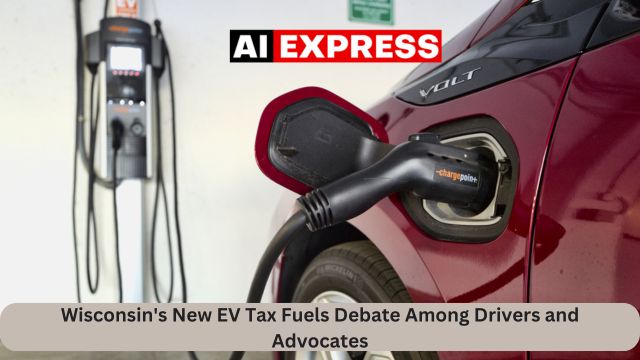Madison, Wisconsin (Aiexpress) – The new year brings new rules, and in Wisconsin, one of them is a new tax on electric vehicle owners.
Electric car owners who charge their vehicles at public charging stations will be subject to a 3 cent per kilowatt-hour excise tax beginning January 1, 2025. The Wisconsin Department of Revenue will collect the revenue and direct it toward statewide road repair.
“They’re trying to offset those revenues and basically find a way for folks who drive electric vehicles to pay at the pump,” said Chris McCahill, managing director of the State Smart Transportation Initiative. “The same way folks who drive gas cars do.”
Eric Wallin, a Wisconsin native, is currently driving his second electric vehicle.
“I got my first EV, a couple-year-old Nissan Leaf, in November of 2019,” he told me. “I didn’t like being dependent on foreign oil. I did not like paying for gas because I felt it was obviously bad for the environment.”
Wallin believes the new EV charging tariff is appropriate.
“A lot of EVs, especially people who are buying EV SUV and EV trucks are way heavier than the gas versions,” he informed me. “They’re going to cause more damage to the roadways, and because they’re heavier, they wear down the roads faster. So, if we go by weight, they should pay more.
However, McCahill claims that EV owners in Wisconsin already paid $175 per year.
“I think a lot of those folks are probably already paying more than someone who drives a gas car in a lot of cases,” he told me. “So with this additional charge on the charging stations, a lot of folks might be paying double what someone driving a gas car might pay.”
McCahill, an advocate for sustainable and fair transportation, is concerned that the additional levies would prevent certain people from buying electric vehicles. He cites neighboring states like Minnesota, which provide incentives such as a $2,500 rebate for purchasing an EV and a $250 credit for tolls.
Despite the new levy, Wallin believes owning an electric vehicle is still worthwhile for daily commutes.
“I mean for me, charging is still way cheaper than what I was paying for gas, especially as little as I use the car, it’s way cheaper than gas,” according to McCahill. “I would ask people to kind of reassess where they can go, how far they’re going on a daily basis, and really think about can you do that with a 300-mile range car.”
Drivers’ actual payment amount will vary depending on the vehicle’s efficiency, driving patterns, and charging frequency.













Leave a Reply